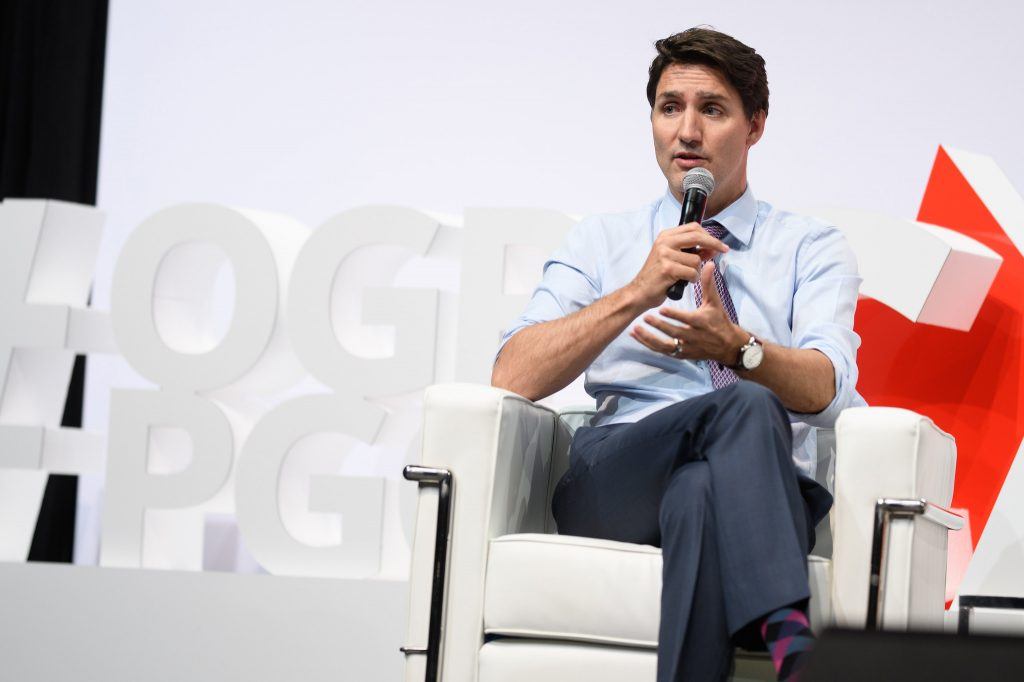An Open Regulation to Protect Our Democracies
Una regulación abierta para proteger la democracia
How can we protect our democracies, our public spaces and our institutions in the digital era? How can we ensure that digital technologies have a positive impact on democracy? Which safeguards should we put in place to build citizen’s trust in automated decision-makingAs governments are increasingly turning to algorithms to support decision-making for public services, transparency and accountability of algorithm use is necessary to minimize their harm and increase ... More and the algorithms that shape our daily lives? Last May, and for the first time in an OGP Summit, those questions were at the core of the discussions around the present and the future of the open government movement.
As Canadian Prime Minister Justin Trudeau stated during the opening plenary, “Governments have a role to encourage platform regulationGovernment reformers are developing regulations that enshrine values of transparency, participation, and accountability in government practices. Technical specifications: Act of creating or reforming ... and set up the frame, but in partnership with platforms and citizens.” It is true, regulating the digital space is the responsibility of the State, and as digital technologies are becoming ubiquitous in our modern lives, it is becoming a pressing issue. The question should rather be why and how to regulate?
Why do we need to regulate the digital space?
Technological development has always been at the crossroads between utopias and dystopias. It has always inspired ideals of enhanced societies as well as fears of inevitable doom. The benefits of technology are dependent on the correct appropriation of it by our societies and on the invisible – or rather visible – hand of the State to avoid or remediate its unwanted consequences.
The Internet initially inspired a collective idea of freedom, of a new borderless and universal space. Its founding values: openness, decentralisation, neutrality and universality, inspired a generation to believe in a new order where horizontality, collaboration, transparencyAccording to OGP’s Articles of Governance, transparency occurs when “government-held information (including on activities and decisions) is open, comprehensive, timely, freely available to the pub... More and free flow of information were the rule. It symbolised the promise of a new democracy, where empowered citizens would be part of a bottom up decision-making and governments would be open and accountable.
However, today, we are far from the social-tech utopia we imagined. The privatisation of the digital space, the concentration of data and wealth in an oligopoly, the massive monetisation of personal data, the unaccountability of tech companies and the rising surveillance are some of the reasons behind a growing citizen mistrust and fear. How did this happen? Partially because we did not regulate appropriately– or rather, because we did not regulate at all. To keep a safe and open Internet, regulation is not just desired but needed.
So, how do we regulate the digital space?
To fight digital mistrust, we need to understand the impact of technologies in our lives, we need fair competition to democratize the tech market, and an updated regulation framework to protect and empower users. The State has to build a new architecture of checks and balances, flexible enough to adapt to the reality of technology in each country and to its continuous development. This architecture has to be built around a , one that understands innovation and technology for an adaptive regulation; and one that embraces the “openness culture” for accountability and multi-stakeholder collaboration. We understand regulator as the independent regulatory authority overseeing a particular economic or social activity for the benefit of the public at large.
We totally agree with Prime Minister Trudeau: “Citizens will lead to us to a safer digital world”. The Internet is by nature decentralized and collaborative; its regulation has to be too. We need to modernize our regulators, help them become more transparent and open towards citizens, civil society, economic actors and public authorities. Through open dataBy opening up data and making it sharable and reusable, governments can enable informed debate, better decision making, and the development of innovative new services. Technical specifications: Polici..., tools, trust, and information the regulator 2.0 has to empower citizens to become micro-regulators and shapers of the rules for the digital space.

Canadian Prime Minister Justin Trudeau on digital governanceAs evolving technologies present new opportunities for governments and citizens to advance openness and accountability, OGP participating governments are working to create policies that deal with the ... More at the OGP Global Summit in Canada.
Practically, what can regulators do?
Regulators can embrace innovation and technological development like the French DPA does through its innovation lab. They can be more transparent and simplify citizens’ access to information, as some US Federal Agencies do with the eRegulations initiative to make regulations easier to find, read, and understand. They can empower users, as the French (ARCEP) and Mexican (IFT) telecom regulators do through open data, public consultations and tools. They can collaborate with stakeholders as the European regulators did with the Reg Tech ecosystem to operationalize the data protection and financial regulations with tools, apps and design. And they can co-create with citizens, as the French ARCEP is doing with its bottom-up rulemaking initiative “J’alerte l’ARCEP”.
Why should the OGP care about digital regulation?
We joined, and continue to be engaged within the OGP to build citizen trust and, above all, to protect democracy around the world. From the spread of disinformation during electoral campaigns, to the erosion of civil liberties and fundamental rights online, an unregulated Internet can become a threat to our democracies. If we want to think about democracy beyond the ballot box, we urgently need to face the fact that digital technologies can have undesired effects on public deliberation, civic space, democratic participation, and citizen trust. As committed and responsible policy-makers, we need to regulate the digital space to protect our democracies.
If we want to achieve the transition to an Open State – as is the vision for the next OGP Steering CommitteeThe Steering Committee is OGP’s executive decision-making body. Its role is to develop, promote and safeguard OGP’s values, principles and interests; establish OGP’s core ideas, policies, and ru... Chairs, we need to ensure that regulators become actors of the openness movement. Transparency, accountability, collaboration, integrity and co-creation have to become their new mantra.
The Internet’s ideals of openness, collaboration, horizontality and transparency sparkled a movement to renew democracy and to adapt our institutions to the 21st century. The emergence of digital technologies made the Open Government movement possible. It is now our responsibility to guide regulators towards an Open Regulation to protect our digital spaces and thus, our democracies.
¿Cómo podemos proteger la democracia, el espacio público y las instituciones en la era digital? ¿Cómo podemos asegurar que las tecnologías digitales tengan un efecto positivo en la democracia? ¿Qué salvaguardas debemos implementar para construir la confianza ciudadana en la toma de decisiones automatizada y los algoritmos que afectan nuestras vidas? En mayo pasado, y por primera vez en una Cumbre de OGP, las discusiones sobre el presente y el futuro del movimiento de gobierno abierto se centraron en estas preguntas.
Como lo expresó el primer ministro de Canadá Justin Trudeau durante la ceremonia de inauguración: “Los gobiernos tienen la responsabilidad de impulsar la regulación de las plataformas y el establecimiento de un marco, pero en colaboración con las plataformas y los ciudadanos.” Es cierto, la regulación de los espacios digitales es responsabilidad del Estado y, en un contexto donde las tecnologías digitales son cada vez más ubicuas, este tema toma gran importancia. La pregunta es: ¿Por qué y cómo establecer las regulaciones?
¿Por qué debemos regular el espacio digital?
El desarrollo tecnológico siempre ha estado entre las utopías y las distopías. Históricamente, hemos imaginado a la tecnología como fuente de sociedades fortalecidas, pero también como el detonador de una catástrofe inevitable. Los beneficios de la tecnología dependen de su apropiación por las sociedades y de la capacidad de la mano invisible – o más bien visible – del Estado de evitar o remediar sus consecuencias negativas.
En sus inicios, el internet inspiró una idea colectiva de libertad y de un nuevo espacio universal y sin límites. Sus valores: apertura, descentralización, neutralidad y universalidad inspiraron a una generación a creer en un orden en el que la horizontalidad, colaboración, transparencia y libre flujo de información eran la norma. Simbolizaba la promesa de una nueva democracia en la que los ciudadanos, empoderados, serían parte de un proceso de toma de decisiones “de abajo hacia arriba” y los gobiernos serían abiertos y rendirían cuentas.
Hoy, sin embargo, estamos lejos de aquella utopía sociotecnológica que habíamos imaginado. La privatización del espacio digital, la concentración de los datos y la riqueza en un oligopolio, la monetización de los datos personales, la falta de rendición de cuentas por parte de las empresas de tecnología y el alza en la vigilancia son algunas razones que explican la falta de confianza y el temor que existen. ¿Cómo ocurrió esto? En parte, porque no creamos las regulaciones necesarias. En realidad, porque no hubo ninguna regulación.
Para asegurar que el internet sea seguro y abierto, la regulación no solo es un deseo sino una necesidad.
¿Cómo regulamos el espacio digital?
Para luchar contra la desconfianza digital, tenemos que saber cuál es el impacto de las tecnologías en nuestras vidas. Además es necesario contar con una competencia justa para democratizar el mercado de las tecnologías y con un marco regulatorio actualizado para proteger y empoderar a los usuarios. El Estado debe establecer un nuevo sistema de controles que sea suficientemente flexible para adaptarse a la realidad de la tecnología en cada país y a sus cambios constantes. Este sistema debe establecerse en función de un regulador 2.0 que comprenda la innovación y tecnología que son necesarias para una regulación que adopte la “cultura de la apertura” para la rendición de cuentas y para la colaboración entre actores.
Estamos completamente de acuerdo con el primer ministro Trudeau: “Los ciudadanos nos llevarán a un mundo digital más seguro”. El internet es, por naturaleza, descentralizado y colaborativo, así que el marco regulatorio debe serlo también. Tenemos que modernizar a los encargados de regular, ayudarles a ser más transparentes y abiertos hacia los ciudadanos, la sociedad civil, actores económicos y autoridades públicas. A través de los datos abiertos, herramientas, confianza e información, el regulador 2.0 debe empoderar a los ciudadanos para ser micro reguladores y a definir las reglas del espacio digital.

Primer ministro de Canadá Justin Trudeau discute la gobernanza digital en la Cumbre Mundial de OGP.
En términos prácticos, ¿Qué pueden hacer quienes se encargan de la regulación? Pueden adoptar la innovación y el desarrollo tecnológico como el DPA de Francia a través de su laboratorio de innovación. Pueden ser más transparentes y simplificar el acceso ciudadano a la información, como lo hacen algunas instituciones federales de Estados Unidos con la iniciativa de e-regulaciones que busca lograr que las regulaciones sean más fáciles de encontrar, leer y comprender. Pueden empoderar a los usuarios, como lo hacen las instituciones reguladoras de las telecomunicaciones de Francia (ARCEP) y México (IFT) a través de datos abiertos, consultas públicas y herramientas. Pueden colaborar con actores como en Europa con el ecosistema de regulación de la tecnología para la protección de datos y las regulaciones financieras con herramientas, aplicaciones y diseño. Además, pueden cocrear soluciones con los ciudadanos como lo está haciendo ARCEP en Francia con su iniciativa de regulación participativa “J’alerte l’ARCEP”.
¿Por qué nos debería importar la regulación digital?
Nos unimos a OGP y seguimos colaborando con la alianza para fortalecer la confianza ciudadana y, sobre todo, para proteger la democracia en todo el mundo. Desde la divulgación de información falsa durante campañas electorales hasta la erosión de las libertades cívicas y los derechos fundamentales en línea, la falta de regulación en el internet puede representar una amenaza a la democracia. Si queremos proteger la democracia más allá de las urnas electorales, tenemos que reconocer el hecho que las tecnologías digitales pueden tener efectos no deseados en la deliberación pública, el espacio cívico, la participación democrática y la confianza ciudadana. Como tomadores de decisiones comprometidos y responsables, tenemos que regular el espacio digital para proteger nuestras democracias.
Si queremos alcanzar la transición hacia un Estado abierto, como lo plantea la visión de los siguientes presidentes del Comité Directivo OGP, necesitamos asegurar que los encargados de diseñar las regulaciones se incorporen al movimiento de la apertura. Transparencia, rendición de cuentas, colaboración, integridad y cocreación tendrá que ser su nuevo mantra.
Los ideales del internet de apertura, colaboración, horizontalidad y transparencia generaron un movimiento para renovar la democracia y adaptar nuestras instituciones al siglo XXI. La emergencia de las tecnologías digitales hacen que el movimiento del gobierno abierto sea posible. Hoy, es nuestra responsabilidad guiar a los encargados del diseño de las regulaciones hacia la regulación abierta para proteger el espacio digital y, por lo tanto, la democracia.
Comments (2)
Leave a Reply
Related Content

Strengthening Democracy and Protecting Civic Rights in the Digital Era
For government to be responsive, and inclusive, a robust enabling environment that protects fundamental rights and democratic institutions is critical.


Paula Reply
Hola ! me interesa este tema como me involucro
Reply
Hola, Paula. Gracias por su interés. Sugiero que se contacte Mauricio Mejia, uno de los autores del blog quien es muy activo en el tema en Twitter: @Mau_MejiaG.